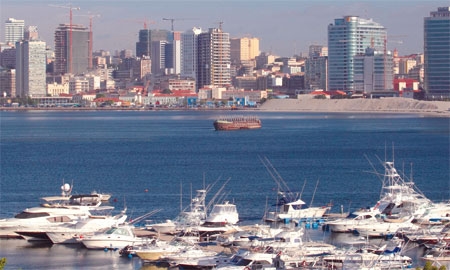Since the signing of the definitive peace agreement in 2002, which drew a line under a 27-year civil war following independence from Portugal, President Jose Eduardo dos Santos and his MPLA (People’s Movement for the Liberation of Angola) party set about rebuilding a war-scarred Angola with determined optimism. Substantial revenues from the country’s huge oil reserves, as well as its well-stocked diamond mines, have helped propel Angola economically to its current standing as the country with the world’s fastest-growing economy over the past decade.
The resource-rich republic now rivals Nigeria as Africa’s top oil exporter. Petroleum production and related activities represent some 80 per cent of the country’s revenue, 85 per cent of Angola’s GDP and 95 per cent of exports.
However, wary of falling victim to the resource curse or the “paradox of plenty”, where countries with an abundance of non-renewable resources focus on one main industry, the Government is now going to great lengths to diversify its economy to avoid overreliance on its top two revenue earners, encouraging greater private-sector involvement in the nation’s development and highlighting opportunities to be found in a raft of sectors. After all, Angola’s economy was not immune to the effects of the recent global economic downturn. Following years of economic expansion, Angola’s GDP contracted in 2009 as the country was hit hard by the drop in oil prices: a barrel of oil in December 2008 was $30.28, compared to a record high of $145 just five months earlier.
As economies recover from recession and regain positive growth patterns, fortunately for Angola demand and prices for crude oil and other commodities are steadily rising. According to President dos Santos the country is now ready for a return to the rapid growth experienced in previous years. In his address to the nation last December, the President, who has led the MPLA since 1979 and is one of Africa's longest serving leaders, announced: “We managed to overcome the consequences of the global economic and financial crisis of 2009. Next year our national economy will resume its high growth indexes.”
The economic contraction of 2009 and reduced oil revenues forced the Government to cut back on its spending plans, hampering its efforts to build up the country’s infrastructure. Nevertheless, according to the IMF, prudent spending and rising oil prices have left the Angolan Government on a more solid financial footing. In a statement last November, the IMF said: “Higher oil prices have helped to strengthen the Government’s financial position, but expenditure restraint has also been a significant contributory factor […] A solid pick-up in the pace of growth is expected for 2011.” The Economist Intelligence Unit concurs with this expectation, forecasting average annual GDP growth of 7.4 per cent over the next five years.
To reduce Angola’s susceptibility to sudden changes in oil prices, various programmes have been launched to spur greater private-sector involvement in other sectors of the economy. For example, the Government is encouraging investors to take a look at the country’s agriculture sector, as well as its vast mineral deposits, which in addition to diamonds include gold, iron, manganese and bauxite – essential for aluminium production.
The regulatory framework for foreign direct investment (FDI) has been clarified and strengthened to woo foreign investors with an increasingly investment-friendly environment. In June, the National Private Investment Agency (ANIP) announced that Angola is now among the top five African countries with the highest level of private foreign investment, along with South Africa, Egypt, Nigeria and (pre-separation) Sudan.
0 COMMENTS